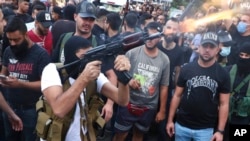A judicial probe into the August 2020 Beirut port blast that killed more than 200 people has rattled Lebanon's Iran-backed Hezbollah — the country's power broker, and other political players. Observers say its followers brought weapons to a demonstration aimed at protesting the investigation and its lead judge last Thursday with the aim of intimidating others. The protest in the capital turned violent, leaving seven people dead, dozens injured and concerns about sectarian violence reminiscent of the 1975 to 1990 civil war.
Dania Koleilat Khatib with the Issam Fares Institute at the American University of Beirut told VOA that Hezbollah supporters carried weapons to "deliberately try to intimidate and undermine" the investigation into the Beirut port blast, one of the biggest non-nuclear explosions in history, and its lead judge, Tarek Bitar.
Shiite Hezbollah is the only militia from the civil war that still holds on to its weapons.
"It's about this excess of power," Khatib said. "This show of power. It's having a lash back [backlash] at them. People would be scared of them. So, once someone says, 'No,' to them, you know, this fear is broken. Recently, anytime they are trying to aggress anyone, they are receiving a slap. So, people don't care anymore."
Although Lebanon's Christian president, Michel Aoun, is Hezbollah's ally in government, he has publicly supported Judge Bitar and his investigation. Analysts say that if Aoun hadn't done so, he would have lost much support from the Christian community. Mainly Christian neighborhoods were badly damaged in the blast, caused by large quantities of ammonium nitrate that had been stored unsafely for years at the port.
Some local reports claim that the explosion occurred at a weapons warehouse belonging to Hezbollah. Its leader, Hassan Nasrallah, denied those accusations, calling the charge an "exceptional injustice."
President Aoun said a government investigation into the explosion has not yet determined the cause and dismissed allegations of Hezbollah's responsibility.
Bitar wants three former ministers including a Sunni Muslim, a Shiite and a Maronite Christian with ties to Hezbollah to be investigated, and this has ruffled the group. Already Hezbollah saw to it that one former judge involved with the investigation was dismissed, and it wants Bitar to follow suit.
Hezbollah has accused the Lebanese Forces — a Christian grouping once also involved in the civil war — of firing first during the protest — a charge it denies.
Lebanon's influential Maronite Catholic patriarch, Bechara Boutros Al-Rai, has condemned the use of the weapons in Thursday's violence, now considered Lebanon's worst street bloodshed in more than a decade. Rai called for the judiciary to be "free from political interference," according to the National News Agency.
Lebanese observer Baria Alamuddin wrote in a piece for Arab News that while calm must be restored, those involved in last week's violence must "alter their murderous trajectory," otherwise, "the drivers of conflict are firmly in motion."
She said the Lebanese army has been the only stabilizing force so far in beleaguered Lebanon, already struggling with economic collapse and an energy crisis.
"The army has frequently stepped in to restore order," she wrote, "but if the army starts to disintegrate along sectarian lines, matters will genuinely begin to spiral out of control.




